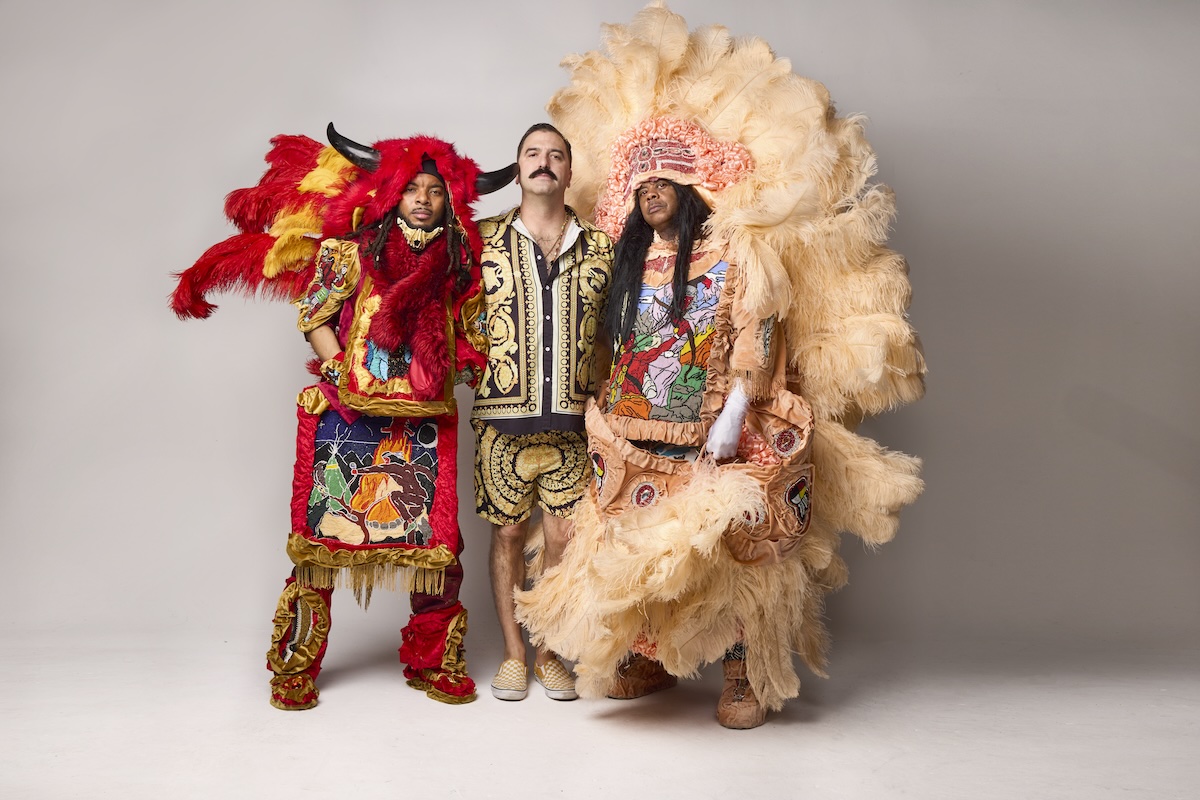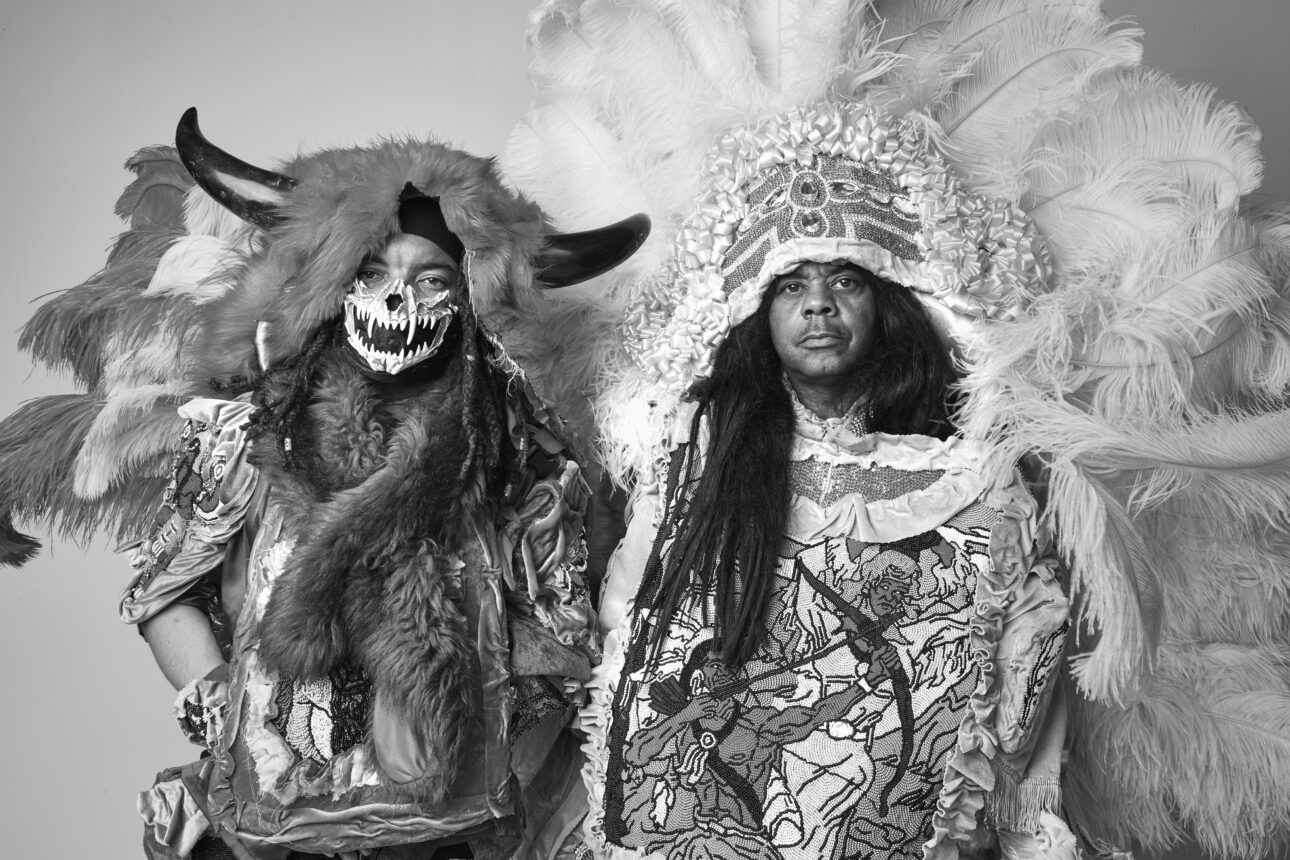Cha Wa is a traditional Mardi Gras Indians greeting in New Orleans that means “here we come” or “we’re comin’ for ya.” Appropriately, a hearty shout of “CHA WA!” is the first thing I hear out of “Spyboy” Irving “Honey” Banister Jr.’s mouth when he and two of his bandmates appear on my Zoom screen. “Here We Come” is also the title of the infectious opening track on Rise Up, the fourth album by their New Orleans funk ensemble, Cha Wa.
Cha Wa saxophonist and vocalist “Wild Man” Tajh Derosier says that the Rise Up single “Music is Medicine” is “in musical form, a personification of what’s happening on the actual street” in New Orleans, where he and Banister have marched for years for Mardi Gras, St. Joseph’s Day, and Super Sunday parades.
Banister and Derosier are proud products of the Mardi Gras Indian culture, the cross-pollination of Indigenous and African-American traditions that’s thrived in Louisiana for the past two centuries. Onstage with Cha Wa, both wear Mardi Gras Indian suits, bright and elaborate outfits they’ve sewn together themselves with satin, beads, and feathers. As Banister says on one of Cha Wa’s earlier albums, “The Native Americans were the first ones to take in the slaves, and that is our way of giving back.”
“If you listen to the lyrics on all of these songs, they’re all about that tradition, but it’s also nuanced,” says drummer Joe Gelini. “It’s not trying to be performative, it’s us talking about what this whole culture is about. It’s inherently secretive. The Mardi Gras Indians used to not even let people take photographs of them. We’re not trying to reveal all the secrets of this society, we’re trying to just pay homage to the culture.”

Rise Up is as spirited and infectious as Cha Wa’s three previous albums, two of which were nominated for Grammys in the Best Regional Roots Album category. There’s a weighty undertone to songs like “Heavy is the Head” though, and the band decided to release the album this year on August 29, the 20th anniversary of Hurricane Katrina’s disastrous landfall in Louisiana. “I can’t tell you exactly when we decided that, but somewhere in the process, it just all sort of clicked,” says Gelini. “We are, I think, celebrating our resourcefulness and our recovery from all of that all the time. And it also makes us question what problems we had in the aftermath of Katrina, and how many of them unfortunately are still here today.”
Gelini, who was born in Connecticut, is the transplant who spearheaded the formation of Cha Wa in 2014. His father was a broadcasting executive who visited New Orleans several times for an annual convention, returning home with music and stories from the Big Easy. “We’d listen to the Meters and the Neville Brothers and Astral Project and Dr. John, and he also would regale me with these tales of [legendary venue] Tipitina’s,” Gelini remembers. By time he tagged along on one of his father’s trips in 1996, “It felt like I had lived here in another lifetime.”
As a student at the Berklee College of Music in Boston, Gelini also met one of the greatest drummers New Orleans has ever produced, Idris Muhammad. “He was the first drummer that I heard playing that New Orleans style of drumming that was really emulating a brass band percussion section,” Gelini says. “What I became aware of was that he was playing a lot of the Mardi Gras Indian rhythms on the drum set, and I wound up spending a whole day with him and getting a lesson. And he told me all about New Orleans, and how the drum set was born in New Orleans.”
After moving to New Orleans a few years later, Gelini got to drum for some of the legends who first brought Mardi Gras Indian music into recording studios and big venues. “Both Honey and I played with Bo Dollis Sr. and the Wild Magnolias at different times, and I played with Monk Boudreaux, so did Honey,” Gelini says.
The Wild Magnolias in particular were a major inspiration on Cha Wa’s approach. “These were like, popular songs that they put out, and weren’t necessarily call-and-response rhythms but they were about the culture. We sort of took a page from them and their approach. They were doing it in the style of music that was popular at the time. They were playing funk and disco, all the great stuff that was coming out in the ’70s. Basically, we’re writing songs that are about the culture and feature culture bearers, but also more [contemporary] song forms.”
“Big Chief Bo Dollis really taught me everything. So I just kept going with it to keep the street feel, to keep the culture alive,” Banister says. He and Gelini met at weekly practices held by Mardi Gras parade musicians and developed the idea for Cha Wa, adding more textures and structures to the traditional Second Line grooves. “Joe liked it, and he decided to add music to it, guitars, additional instruments. He’s never stepped on anybody’s toes, he’s never disrespected the culture, he just added to it, like other groups were doing.”
Cha Wa got to collaborate with another one of the city’s legends, Irma Thomas, for the first time on Rise Up. When his band shared the bill with Thomas for the Big Easy Cruise in 2023, Gelini struck up a conversation with the Soul Queen of New Orleans as she was headed to the cruise ship’s casino. “I said, ‘Miss Irma, can I walk you to wherever you’re going?’”


Thomas liked “Why You Wanna Do Me Like That,” which Gelini had written with acclaimed Louisiana guitarist Shane Theriot, and made the bluesy song her own. “She’s 84 and she’s still performing at her highest level, it’s really incredible,” Gelini says. “She was just telling us stories, cracking jokes. She was like, ‘I figured you’d probably wanna take some pictures, so y’know, I put on my makeup for y’all.’”
Some of the guest musicians on Rise Up were recorded in New Orleans, but most of the album was recorded a few hours away in Maurice, Louisiana. Dockside Studio, where Dr. John and B.B. King recorded some of their best work, a secluded recording complex on the banks of the Red River that allowed the members of Cha Wa to get out of the city, bond with each other, and focus on recording with producer Dave Trumfio (Built To Spill, Wilco).
“It’s really a wonderful place. They have apartments upstairs, so we literally stayed there,” Gelini says. “In New Orleans, musicians have 10 gigs a day, we’re constantly working and things pop up, it’s very spur of the moment. So it’s rare to be able to go to a place that’s that far away, just dedicating ourselves to spending our time there and really focusing on our music. We made dinner every night, y’know, sat around a big table and ate together. It was a very communal process.”
Spreading the Mardi Gras Indian culture as an international touring act has also made the members of Cha Wa closer, and Gelini and Banister usually room together on the road. “I’ve got a 5 year old and a 10 month old. And if I’m facetiming with them and I miss my kids. Honey is just there, just kinda giving me the support that I need to keep a positive attitude when I’m thousands of miles away from my family,” Gelini says. “We just try to support each other.”
Despite Hurricane Katrina being the thematic focus of their new album, the trauma of the storm, the floods, and the long period of displacement and uncertainty is still difficult for some members of Cha Wa to put into words. “It just was something I don’t talk about too much,” the usually gregarious Banister says in a rare tight-lipped moment. “The hurricane was bad, but it brought so many people together.”
“We came back so soon and put up with the rebuilding process, and the mold, and the refrigerators on the corner,” Gelini says. “One thing I will always remember is the smell. It was a terrifying time. And everybody’s telling us that the United States shouldn’t spend its time or effort rebuilding this city. No one taking into consideration how New Orleans is the cradle of American music. It’s where ragtime and jazz and rock’n’roll were all created. I can’t imagine a world where I don’t live in New Orleans.”




